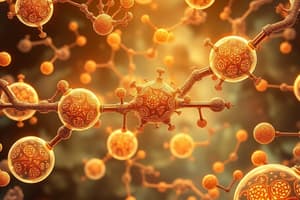Podcast
Questions and Answers
What is the primary function of chromatography in biochemistry?
What is the primary function of chromatography in biochemistry?
- To analyze the interaction of light with molecules
- To determine the three-dimensional structure of molecules
- To separate mixtures of molecules (correct)
- To identify and quantify molecules
Which of the following mechanisms is NOT a method of enzyme regulation?
Which of the following mechanisms is NOT a method of enzyme regulation?
- Allosteric regulation
- Feedback inhibition
- X-ray crystallography (correct)
- Covalent modification
How do hormones primarily influence metabolic processes in cells?
How do hormones primarily influence metabolic processes in cells?
- By acting as messengers to modulate enzyme activity (correct)
- By increasing cellular respiration rates
- By inhibiting cell division
- By directly altering DNA sequences
What advantage does cellular compartmentalization provide in biochemical processes?
What advantage does cellular compartmentalization provide in biochemical processes?
Which application of biochemistry involves developing new methods for disease diagnosis?
Which application of biochemistry involves developing new methods for disease diagnosis?
What is the primary function of carbohydrates in living organisms?
What is the primary function of carbohydrates in living organisms?
Which of the following types of biological molecules are crucial for energy storage?
Which of the following types of biological molecules are crucial for energy storage?
What role do enzymes play in biochemical reactions?
What role do enzymes play in biochemical reactions?
Which metabolic process converts light energy into chemical energy?
Which metabolic process converts light energy into chemical energy?
Which of the following is NOT a part of nucleic acids?
Which of the following is NOT a part of nucleic acids?
What are triglycerides primarily composed of?
What are triglycerides primarily composed of?
Which of the following statements about proteins is true?
Which of the following statements about proteins is true?
What is the primary energy currency produced during cellular respiration?
What is the primary energy currency produced during cellular respiration?
Flashcards
Chromatography
Chromatography
A technique that separates mixtures of molecules based on their physical and chemical properties. There are various types, including gas chromatography, liquid chromatography, and electrophoresis.
Spectroscopy
Spectroscopy
A technique that measures how light interacts with molecules. It helps identify and quantify molecules. Examples include UV-Vis spectroscopy and NMR spectroscopy.
X-ray Crystallography
X-ray Crystallography
A technique that determines the three-dimensional structure of molecules. It uses the diffraction of X-rays by crystalline materials.
Enzyme Regulation
Enzyme Regulation
Signup and view all the flashcards
Hormonal Regulation
Hormonal Regulation
Signup and view all the flashcards
What is biochemistry?
What is biochemistry?
Signup and view all the flashcards
What are carbohydrates?
What are carbohydrates?
Signup and view all the flashcards
What are lipids?
What are lipids?
Signup and view all the flashcards
What are proteins?
What are proteins?
Signup and view all the flashcards
What are nucleic acids?
What are nucleic acids?
Signup and view all the flashcards
What is metabolism?
What is metabolism?
Signup and view all the flashcards
What is cellular respiration?
What is cellular respiration?
Signup and view all the flashcards
What is photosynthesis?
What is photosynthesis?
Signup and view all the flashcards
Study Notes
Introduction to Biochemistry
- Biochemistry is the study of chemical processes within and relating to living organisms.
- It encompasses a broad range of topics, including the structure and function of biological molecules, metabolic pathways, and the regulation of these processes.
- Key focus areas include proteins, carbohydrates, lipids, and nucleic acids.
- It utilizes techniques from chemistry, physics, and biology to understand these intricate processes.
Biological Molecules
- Carbohydrates:
- Primary source of energy for many organisms.
- Composed of carbon, hydrogen, and oxygen atoms.
- Include monosaccharides (simple sugars), disaccharides, and polysaccharides (complex sugars).
- Examples include glucose, fructose, and starch.
- Lipids:
- Diverse group of hydrophobic molecules.
- Crucial for energy storage, membrane structure, and hormone production.
- Types include triglycerides, phospholipids, and steroids.
- Examples include fats, oils, and cholesterol.
- Proteins:
- Complex macromolecules composed of amino acids.
- Crucial for a wide variety of biological functions including catalysis, structural support, transport, movement, and defense.
- The sequence of amino acids determines the protein's structure and function.
- Examples include enzymes, antibodies, and hormones.
- Nucleic Acids:
- Store and transmit genetic information.
- Two primary types: DNA (deoxyribonucleic acid) and RNA (ribonucleic acid).
- Composed of nucleotides.
- Key players in protein synthesis and gene expression.
Metabolic Pathways
- Metabolism:
- All the chemical reactions that occur in an organism.
- Includes both catabolism (breakdown of molecules) and anabolism (synthesis of molecules).
- Cellular Respiration:
- Major metabolic pathway for energy production.
- Breaks down glucose to produce ATP, the cellular energy currency.
- Includes glycolysis, the Krebs cycle, and oxidative phosphorylation.
- Photosynthesis:
- Anabolic pathway used by plants and other photosynthetic organisms to convert light energy into chemical energy.
- Converts carbon dioxide and water into glucose.
- Occurs in chloroplasts.
- Enzyme Function:
- Enzymes are biological catalysts.
- Speed up biochemical reactions without being consumed.
- Their activity is influenced by factors like temperature and pH.
- Crucial for nearly every biological process.
Techniques in Biochemistry
- Chromatography:
- Separates mixtures of molecules based on their physical and chemical properties.
- Different types include gas chromatography, liquid chromatography, and electrophoresis.
- Spectroscopy:
- Measures the interaction of light with molecules.
- Used to identify and quantify molecules.
- Examples include UV-Vis spectroscopy and NMR spectroscopy.
- X-ray Crystallography:
- Determines the three-dimensional structure of molecules.
- Based on the diffraction of X-rays by crystalline materials.
Regulation of Biochemical Processes
- Enzyme Regulation:
- Cells regulate metabolic pathways through enzyme activity.
- Mechanisms include feedback inhibition, allosteric regulation, and covalent modification.
- Hormonal Regulation:
- Hormonal signals control metabolic processes.
- Hormones act as messengers to modulate enzyme activity and metabolic fluxes.
- Cellular Compartmentalization:
- Biochemical reactions often occur in specific cellular compartments.
- Compartmentalization allows for regulation and efficiency in metabolic processes.
Importance of Biochemistry
- Understanding biochemical processes is vital for numerous applications:
- Developing new drugs and therapies
- Diagnosing diseases
- Improving agricultural practices
- Advancements in biotechnology and genetic engineering.
- Essential for comprehending life processes at a molecular level.
Studying That Suits You
Use AI to generate personalized quizzes and flashcards to suit your learning preferences.




